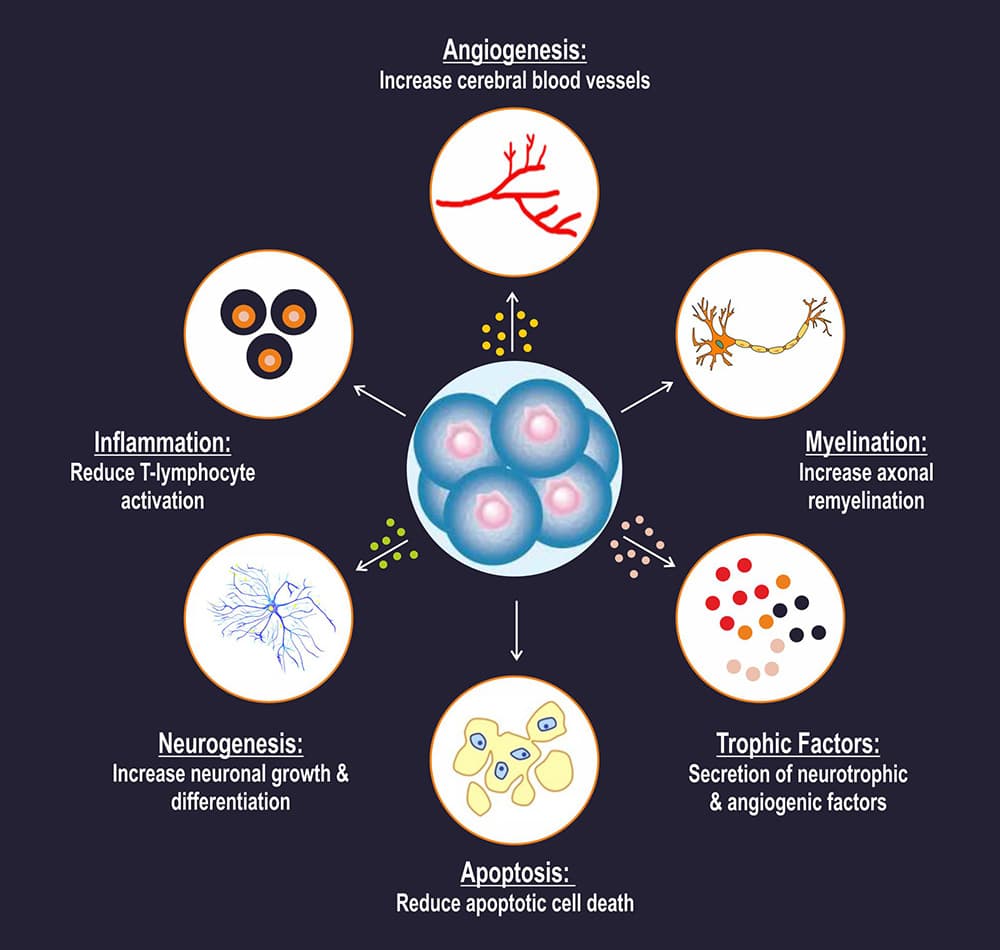
Autologous Bone Marrow Mononuclear Cells Grafting Dementia treatment is a secure treatment which has the potential to slow down deterioration and is a plausible dementia treatment. Autologous Bone Marrow Mononuclear Cells Grafting for Dementia can help generate new cells to repair damage and restore lost cells in the brain. Various clinical trials with bone marrow derived mesenchymal cells have shown that autologous bone marrow mononuclear cells grafting for dementia can target the host brain cells and free some molecules that help support the development of new nerve cells including creating an environment to support their survival. These bone marrow-derived cells used during autologous bone marrow mononuclear cells grafting for dementia are also involved in neuroprotection, angiogenesis and several other metabolic activities that may together help to improve the reasoning, thinking and memory abilities of individuals suffering from dementia. During autologous bone marrow mononuclear cells grafting for dementia, the bone marrow-derived cells exude a group of neurotrophins, growth factors and other supportive substances. This helps in improved continued existence of the neurons through facilitations of neuroprotective responses like angiogenesis, axonal guidance and regeneration which may further result in improved cognitive function, thereby enabling dementia treatment.
Cell treatment for dementia, in India, at NeuroGen, has been done for patients with vascular dementia, Alzheimer’s Disease, Fronto-temporal dementia, etc. At NeuroGen, each patient has been given cell treatment for dementia, with a customized & personalised approach. For Dementia treatment in India, our patients are provided with an environment which is conducive to healing, so that their experience remains enriching. Our patients, at NeuroGen BSI, for dementia treatment in India, have shown marked improvement in their functional and symptomatic conditions followed by autologous bone marrow mononuclear cells grafting for Dementia, with the extensive neurorehabilitation program. These positive changes are recorded objectively on the neuropsychological test of Mini Mental Status Examination (MMSE).
At NeuroGen, each patient has been given autologous bone marrow mononuclear cells grafting for dementia, with a customized & personalised approach. Our patients are provided with an environment which is conducive to healing, so that their experience remains enriching
Improvements that have been seen post Dementia Treatment in India:
Proper emotional responses
More cooperation
Reduced crying spells
Improved sitting tolerance
Compliance to therapies
Better cognitive functioning(memory, attention, concentration & mathematical abilities and reasoning)
Keeping up with a routine
Improved independence
Better fine motor activities
Better oral-motor control & swallowing
Improved Localization of objects
One of the most common symptoms for dementia is memory loss. However, not all memory loss problem cannot be directly linked with dementia. It could be the result of many other conditions, it is not possible to answer this question without a proper study of the case.
Defining dementia is a complex one as it is a descriptive term for a number of symptoms that are caused by a number of neurological disorders. Dementia can be curable only if two or more brain functions like memory, language, judgments are affected without loss of consciousness.
Yes in most cases. Alzheimer’s disease is a common type of progressive dementia. Advanced dementia is commonly seen in individuals with Alzheimer’s disease, Lewy body dementia and vascular dementia.Other disorders such as Huntington’s disorder, Traumatic Brain Injury, Multiple sclerosis and Parkinson’s disease can also lead to dementia.
Dementia occurs due to the damage of the brain cells. This damage hinders with the capability of brain cells to correspond with each other. When this happens, the thinking, behavior and feelings can get affected.
Dementia can be grouped into different types depending on their common features. The commonly used classifications will include:
Cortical dementia
Subcortical dementia
Progressive dementia
Primary dementia
Secondary dementia
Dementia symptoms interfere with normal brain functioning and cognitive abilities like emotional behavior and personality, language, memory, perception and thinking and judgment.
Some of the common symptoms seen in an individual with dementia include memory loss, difficulty communicating, difficulty with complex tasks, difficulty with planning and organizing and Difficulty with coordination and motor functions.
The chief cause for the occurrence of dementia is the loss of brain cells. Currently, the pharmacological treatment is unable to prevent, cure and stop the disease progression. The symptoms can be improved through medications and supervised therapy but again it cannot repair and renew the loss of neurons that occurs. Now with the discovery of autologous bone marrow mononuclear cells grafting for dementia treatment in India, we can plan to control the disease progression.
Dementia Treatment in India involves autologous bone marrow mononuclear cells grafting which generates new cells to fix damage and restore lost cells in the brain to give a well defined treatment options for dementia.
autologous bone marrow mononuclear cells grafting for dementia has been revealed to produce a group of neurotrophins, growth factors and other supportive substances. This helps in better survival of the neurons through facilitation of neuroprotective responses like angiogenesis, axonal guidance and regeneration, which may further result in improved cognitive function.
Yes there are different types of dementia. Many individuals suffer from various types of dementia like Vascular, Alzheimer’s and Fronto temporal dementia. Each of these cases requires individual care and a tailor made adaption to meet their needs. We aspire to offer our patients in an environment that is healthy and enriching for them.
Following autologous bone marrow mononuclear cells grafting for dementia treatment in India combined with Neurorehabilitation program our patients have shown efficient and suggestive improvements in their conditions under the guidance of our team of expert doctors and therapists. The improvements seen in these cases are appropriate emotional responses, more cooperation, reduced crying spells, improved sitting tolerance and compliance to therapies improved.
Yes autologous bone marrow mononuclear cells grafting for dementia treatment in India has a lot of prospective to stop the development of dementia. autologous bone marrow mononuclear cells grafting for dementia is safe and improves the quality of life of elderly patients who are disillusioned thinking there is no cure for them.
